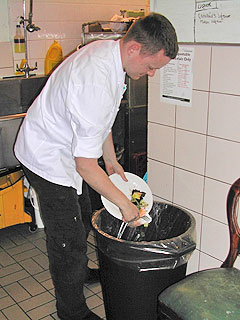Commercial Food Waste Diversion
- Commercial Food Waste Info Booklet
- Commercial Food Waste Newsletters
- Posters
- Acceptable/Unacceptable Materials
- Compostable Bags
- Frequently Asked Questions
- Benefits

Background
In June 2005 the RDN banned disposal of food and other organic waste from commercial and institutional sources at the region's solid waste facilities, putting the first phase of its organics diversion strategy into action.A 2004 waste composition study had found that food waste and compostable paper comprised 32% of the industrial, commercial, institutional (ICI) waste stream. The ban on commercial food waste in the Regional Landfill followed the opening of International Composting Corporation in Nanaimo, the first composting facility licensed under the RDN Waste Stream Management Licensing Bylaw.
Extensive consultation preceded the commercial food waste and organics disposal ban in 2005 with follow-up site visits to over 200 businesses and organizations. Landfill disposal of compostable organic waste from a commercial or institutional facility is not permitted under Bylaw 1531.
All commercial and institutional facilities such as restaurants, grocery stores, and school and hospital cafeterias are now required to have food waste diversion systems in place. Commercial food waste includes raw and cooked food and other compostable organic material from commercial and institutional premises. See Acceptable/Unacceptable Materials for a complete list.
The RDN has taken a non-prescriptive approach to the commercial food waste ban. The RDN serves as the regulator and resource, allowing affected businesses and organizations to comply using the most cost-effective and efficient methods for their operations.
The 2005 commercial food waste disposal ban was the first step in organics diversion. The second step, providing region-wide Green Bin residential food waste collection, was accomplished in October 2011.
It is projected that commercial and residential food waste collection will divert 12,000 tonnes of organic waste from the landfill. Improvements at the Church Road Transfer Station have facilitated expansion of commercial food waste collection service in the northern area of the region. All businesses and institutions providing food services are now required to have systems in place to collect and transport food waste to a licensed composting facility.
The information on our Commercial Food Waste Diversion website is intended to help businesses adjust to solid waste disposal regulations. Contact information and helpful tips that will aid in complying with the ban are also included.
The RDN would like to thank you for your efforts in taking responsibility for reducing the waste generated by your organization.
